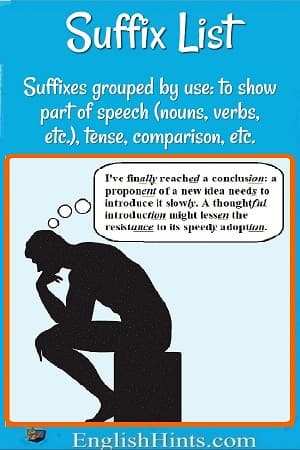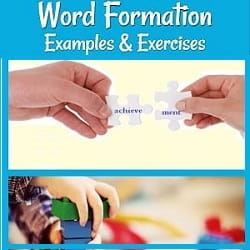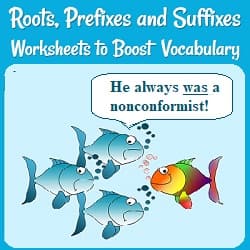Suffix List by Use
This suffix list is a continuation of the Alphabetical List of Suffixes. It's arranged to make it easier to find the information you want with less scrolling.
That page has one list with every kind of suffix mixed together. This suffix list has similar uses of word endings grouped together so they are easier to learn.
It starts with the Noun-Building Suffix List. It includes the word endings that identify a word as a noun. You can add these suffixes to a verb or an adjective to make a noun.
For example, if you add -ance to the verb 'assist', you get the noun 'assistance.' (If you add '-ant' you get 'assistant'-- the noun for a person who assists others. See Noun-Building Suffixes for Groups of People, the next group of endings.)
If you remove the ending -de of the verb 'conclude' and add '-sion', you get a 'conclusion.'
Below the two noun groups are Adjective-Building Suffixes, Adverb-Building Suffixes, and Verb-Building Suffixes.
Then there are Suffixes to Show Plurals and Tenses. (These are: -s and -es, -ed, -ing, and -en.) There's an explanation and then the suffixes listed in alphabetical order. After that see Suffixes for Comparison. Finally, there's a short explanation on how to use suffixes to help identify the meaning of new words.
Noun-Building Suffix List

(See also -es, & -s for plurals in the Singular/ Plural part of the Tense & Plurals section below.)
These are suffixes that mean 'the condition of ---', 'the result of ---', etc.
Note that the endings in #2 & 6 are usually attached to verbs, to make them into nouns.
Suffixes in #1, 4 & 7 are usually added to adjectives (for #1 ‘-nce’ or ‘-ncy’ replaces the ‘t’ of the adjective.) #3 & 8 are usually added to other nouns.
1. –ance, -ancy, -ence, -ency: assistance, attendance, consistency, deficiency, dominance, endurance, evidence, expectancy, negligence, precedence, relevance, tolerance, urgency, etc.
2. –ion, -sion, -tion: attention, conclusion, definition, elimination, estimation, generation, justification, legislation, revision, substitution, verification, etc. (See –ate and –fy in Verb Builders.)
3. –ism (a system of belief): capitalism, communism, federalism, nationalism, patriotism, etc.
4. –ity: adaptability, community, diversity, maturity, predictability, stability, etc.
5. -logy (the study of): archeology, biology, cardiology, psychology, etc.
6. –ment: achievement, attainment, commitment, postponement, requirement, etc.
7. –ness: carelessness, fearlessness, friendliness, sleepiness, sweetness, etc.
8. –ship: authorship, citizenship, friendship, relationship, scholarship, etc.
Noun-Building Suffix List: People
1. -an, -ian (a person belonging to a country or group; many of these can also be used as adjectives): American,Christian, civilian, Indian, Korean, physician, etc.
2. –ant, -ent (a person who assists, etc.): assistant, defendant, participant, resident, student
3. –ee (a person who receives the action-- is deported, employed, etc.): deportee, employee, nominee, referee, refugee, trustee, etc.
4. –er, -ar, -or (a person who does something; often used for occupations): banker, beggar, employer, exhibitor, killer, liar, organizer, painter, survivor, etc.
5. –ist (a person belonging to a group with similar beliefs or skills): biologist, chemist, communist, guitarist, machinist, nationalist, organist, physicist, etc.
Adjective-Building Suffix List
1. –able, -ible (able) -- (negatives/antonyms in parentheses): (in)accessible, (un)adaptable, (un)bearable, (in)flexible, (dis)honorable, (ir)reversible, (un)sustainable, (in)tolerable, etc.
2. -al (related to; pertaining to): biological,
environmental, natural, supplemental, technical, visual, etc.
3. -ant (being ___): relevant, reluctant, significant, tolerant, etc.
4. -ary (belonging or related to): discretionary, diversionary, military, supplementary, voluntary, etc.
5. -ed (from a verb's past participle, often describing a feeling or condition): annoyed, complicated, surprised, united, etc.
6. -en (from the irregular past participle of a verb): broken, fallen, hidden, etc.
7. -ent: consistent, evident, negligent, proficient, sufficient, urgent, etc.
for -er and -est, see Suffixes for Comparisons. (They make regular adjectives into comparative or superlative adjectives.)
8. –ful (full of): careful, doubtful, fearful, helpful, grateful, tactful, etc.
9. –ic (nature of, like): acidic, domestic, emphatic, geologic, metallic, patriotic, realistic, symbolic, sympathetic, etc.
10. -ing (from a verb's present participle, often describing what causes a condition or feeling): annoying, inspiring, surprising, tiring.
11. –ish (similar to, belonging to): girlish, childish, reddish, Scottish, etc.
12. –ive (related to; makes a verb into an adjective): abusive, conclusive, exclusive, ineffective, supportive, etc.
13. –less (without): breathless, careless, effortless, fearless, lifeless, tasteless, tireless, etc. (See also –ness in the Noun Builders.)
14. –ous (having, full of): courageous, erroneous, malicious, nervous, obvious, serious, etc.
15. -y (presence of, full of): airy, cheery, cloudy, noisy, sleepy, windy
Adverb-Building Suffix List
(from adjectives—often combining –ic & -al, etc.)
1. –ly (how something is done): carefully, carelessly, conversely, effortlessly, logically, realistically, strategically, willingly, etc.
Verb-Building Suffix List
(see also –ed, -es, -ing, and –s in the Plurals and Tenses section below.)
1. –ate: to allocate, disintegrate, eliminate, incorporate, estimate, manipulate, terminate, etc.
2. -en (to make-- from Old English): to blacken ('to make black' or at least blacker), deaden, deepen, fatten, frighten, heighten, redden, whiten.
3. –fy (to make): to amplify, beautify, clarify, fortify, unify, verify, etc.
4. –ize (to make): to familiarize (to make something familiar to someone), immobilize, liberalize, memorize, organize, penalize, realize, etc.
Suffixes to Show Plurals & Tenses
We add '–s' (or sometimes '–es') after most nouns for plurals (more than one).
We use ‘-es’ to make it easier to hear the plural ending after words ending in ‘s’ or similar sounds. (Other sounds: ‘x’, ‘ch’, or ‘sh,’ some words ending with ‘o’ and all that end with a consonant + ‘y’ -- which changes to ‘i.’)
So we say one bus but two buses; one box or two (or more) boxes; a set of brushes, or several churches. We also talk about a bag of potatoes or a serving of fries, two babies, or a few puppies.
In English adjectives do not change for singular or plural. Present tense verbs do change form, but in a way opposite to nouns. Only the 3rd person singular (he, she, or it) adds an ‘-s’ (or ‘-es’ for the sounds above) to the base form of the verb.
Other verb tenses do not change form based on singular or plural, but some do add a suffix to show the tense. The regular past tense ending is ‘–ed’ (or –d if the verb already ends in ‘e’), but there are many irregulars.
We use past participles to form the "perfect" tenses AND for making adjectives. Like the regular past tense, they usually end in ‘-ed.’ However, many irregular past participles end in ‘en”: broken, eaten, given. (See Irregular Past Participles for a list and examples.)
The suffix ‘-ing’ makes the present participle. We use present participles to form continuous tenses. Examples: I’m going to the store; he is listening to music; the babies were crying for hours. Some also make adjectives. (Examples: boiling (water), boring (movies), or terrifying (experiences.)
So the List for these Suffixes is:
1. -ed for past tense or a past participle for regular verbs: designed, identified, reacted, talked, etc.
2. -en for some irregular past participles: eaten, forgotten, written, etc.
3. -ing for present participles: doing, sleeping, etc.
4A. –es for plural (2 or more) nouns with the base endings mentioned above: 2 dresses, a set of glasses, a family of foxes, suffixes, mustaches, tomatoes, cookies.
4B. -es for 3rd person singular of present tense verbs with those endings: He brushes his teeth. The baby cries a lot unless her mother carries her. Tom goes to an art class every Saturday. Does Joe go too?
5A. –s for 3rd person singular present for most verbs: Mary reads a lot of books and magazines. Joe listens to tapes. He likes to listen to science programs.
5B. –s to make most nouns plural: 2 boys, 3 girls, 4 cats, and some dogs (as well as books, magazines, tapes and programs above.)
Suffixes for Comparison
1. –er: bigger, smaller, faster, slower, noisier, quieter. (We add -er to adjectives to show that something has more of that quality than something else does. . "An elephant is bigger than a lizard.")
2. –est: Jim is the biggest student in his class and Sally is the smallest, but Sally is the noisiest of them all. (We add -est to adjectives to show that this one has the most of some quality compared to all the others.)
Recognize New Words Using Suffixes
‘Revolve’ means to turn over (the way a wheel turns.) Knowing that, you might be able to guess that a revolution is a complete turning over or major change. (Use the context-- the words surrounding a new word-- to help you guess.) To revolutionize is to cause that major change.
Strategies are well-thought-out plans to achieve long-term goals. So you can infer that strategic thinking is long-term planning. You could even guess that ‘to strategize’ means to make such plans.
If you know the meaning of beautiful, you can guess that ‘to beautify’ is to make something beautiful. You can guess that a city’s ‘beautification campaign’ is an effort to make a city more attractive.
Check out Word Families for more on how the parts of speech are formed with different suffixes.
See more examples of how roots and affixes combine to form words. (This page also has a gap-fill to practice words from the examples.)
Knowing a few roots & prefixes can help you figure out meanings of new words. These worksheets show you how, step by step.
Networking Vocabulary Games and Teamwork and Cooperation Vocabulary have category games to practice noun, adjective, and verb suffixes. Practice Suffixes has more explanation and multiple choice practice.
Didn't find what you
needed? Explain what you want in the search box below.
(For example, cognates, past tense practice, or 'get along with.') Click to see the related pages on EnglishHints.
| site search by freefind | advanced |








